Module 5 Lao She Teahouse Unit 3 Language in use 课件30张PPT
文档属性
| 名称 | Module 5 Lao She Teahouse Unit 3 Language in use 课件30张PPT | 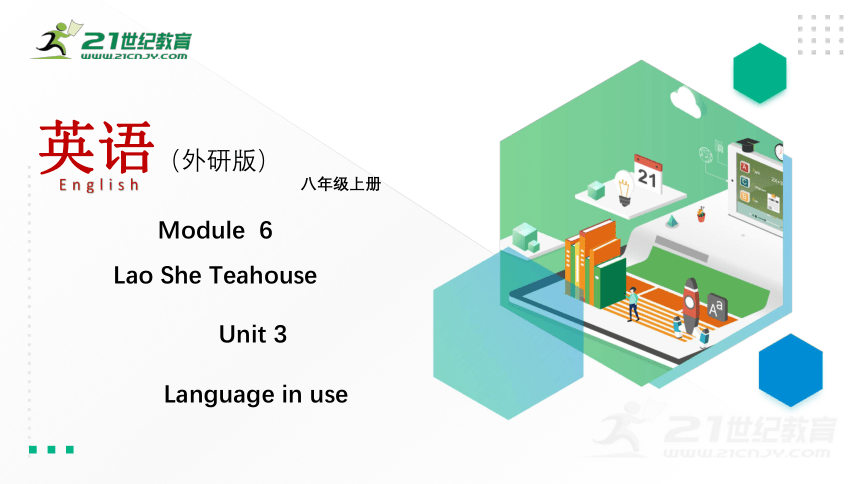 | |
| 格式 | pptx | ||
| 文件大小 | 15.6MB | ||
| 资源类型 | 试卷 | ||
| 版本资源 | 外研版 | ||
| 科目 | 英语 | ||
| 更新时间 | 2021-08-14 07:43:29 | ||
图片预览

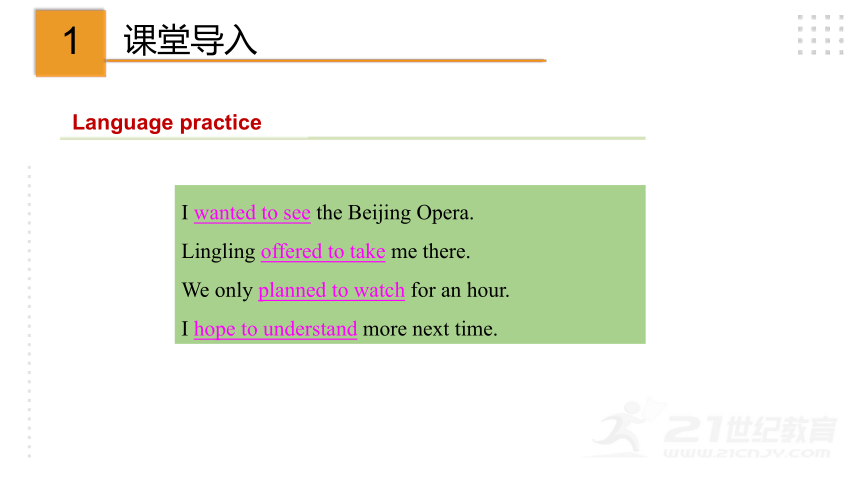
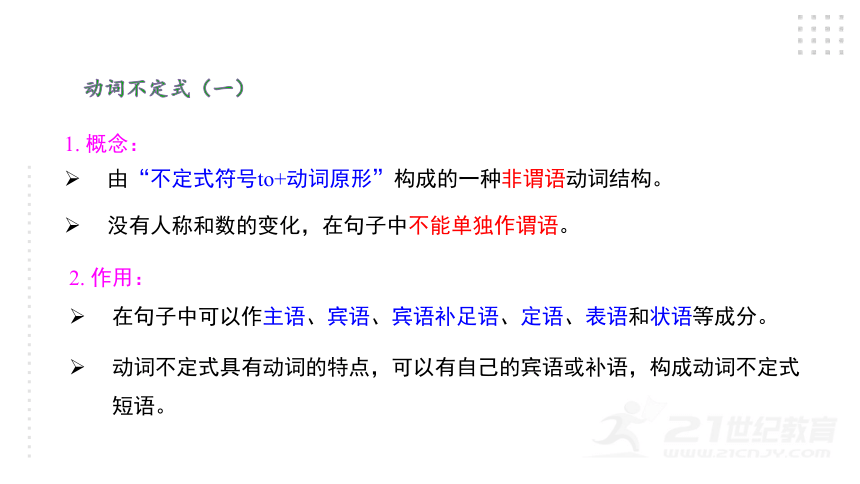

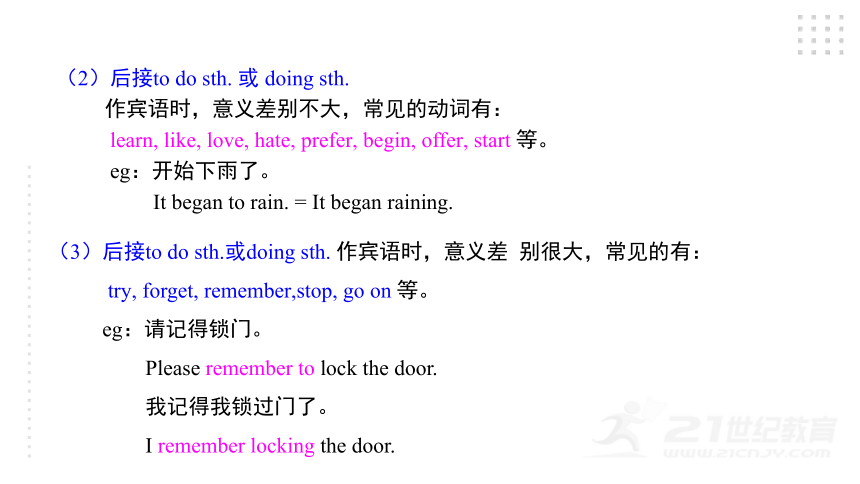
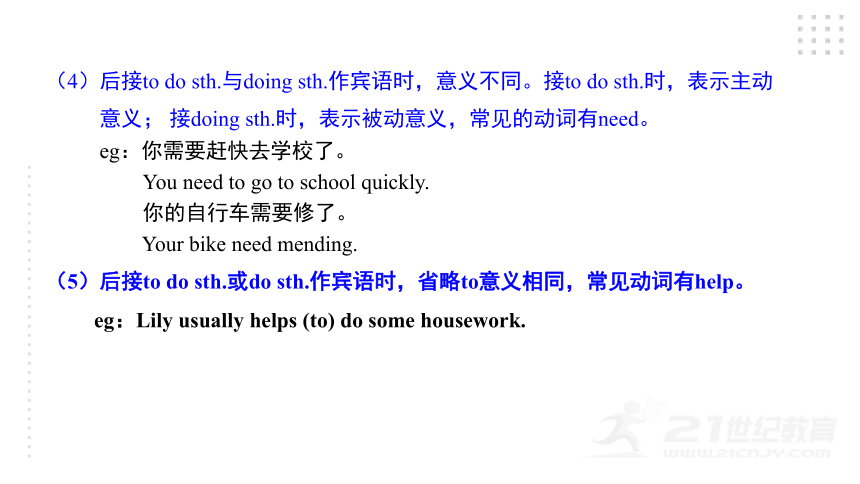
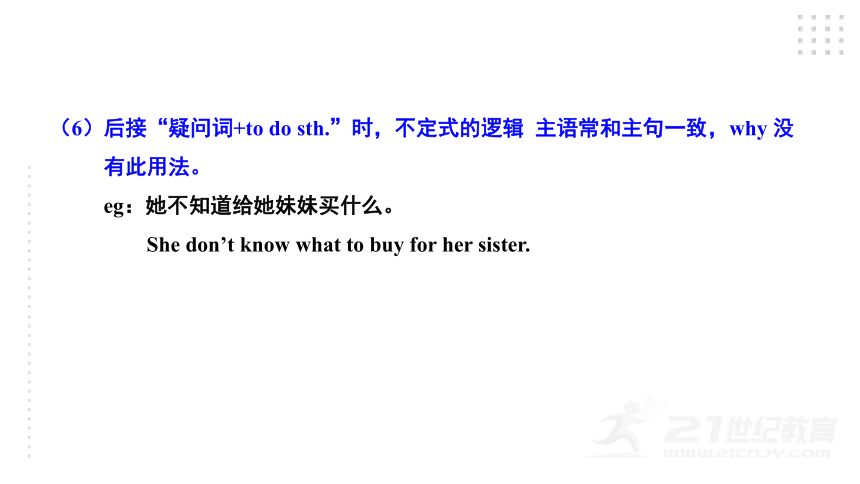
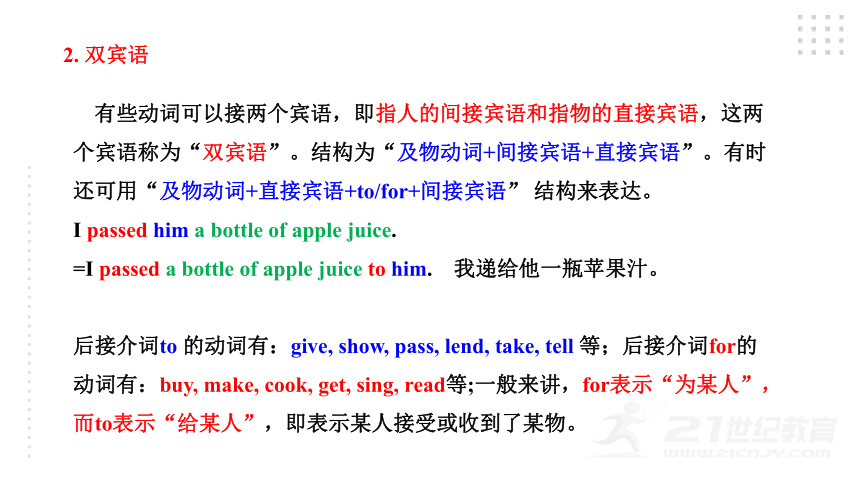
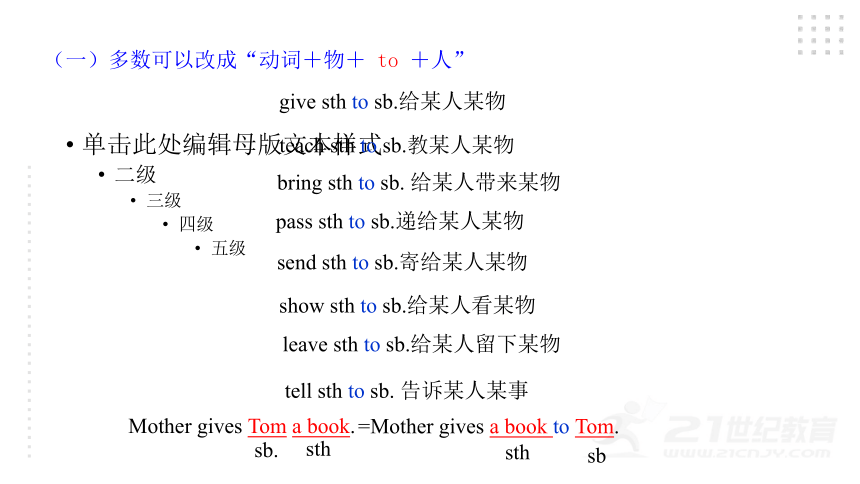
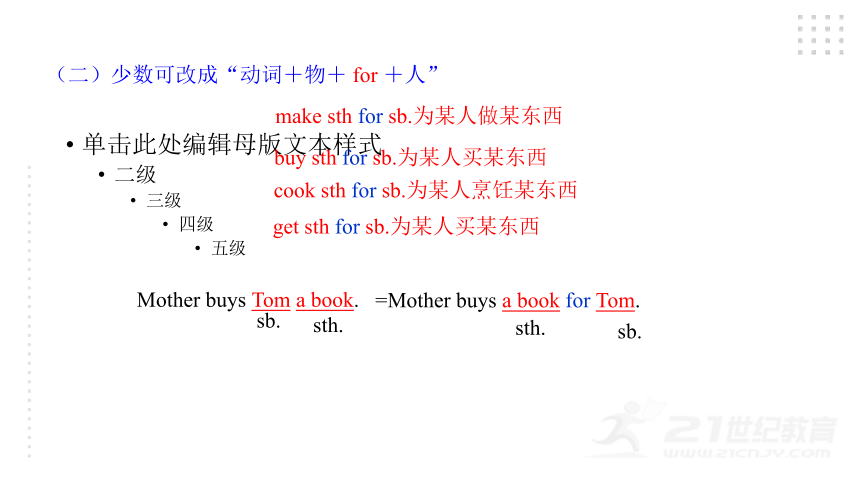
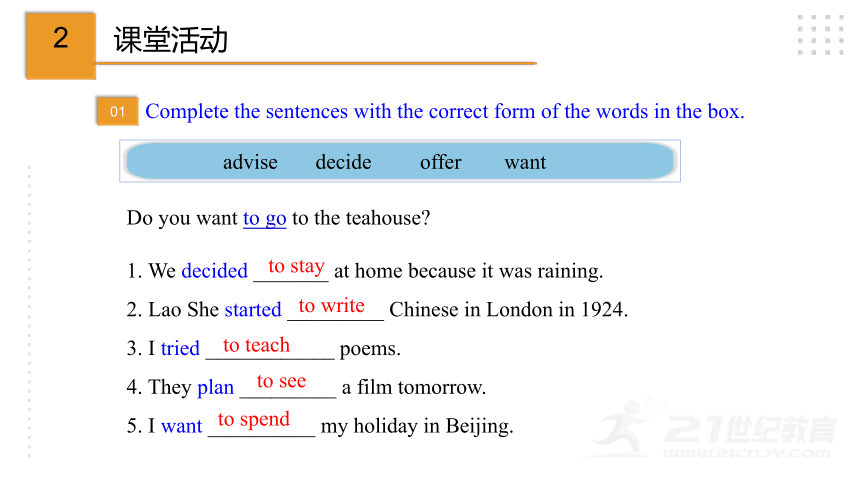
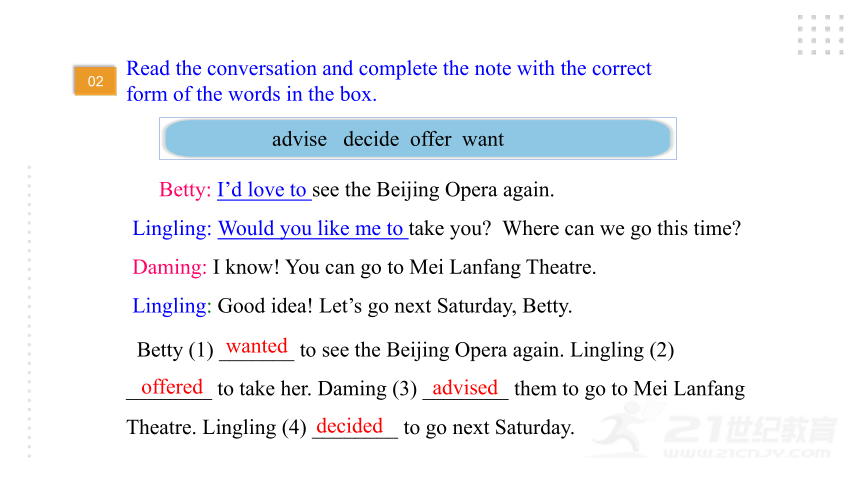
文档简介
英语(外研版)
八年级上册
English
Module 6
Lao She Teahouse
Unit 3
Language in use
Language practice
I wanted to see the Beijing Opera.
Lingling offered to take me there.
We only planned to watch for an hour.
I hope to understand more next time.
1
课堂导入
1. 概念:
由“不定式符号to+动词原形”构成的一种非谓语动词结构。
没有人称和数的变化,在句子中不能单独作谓语。
2. 作用:
在句子中可以作主语、宾语、宾语补足语、定语、表语和状语等成分。
动词不定式具有动词的特点,可以有自己的宾语或补语,构成动词不定式短语。
动词不定式(一)
3. 不定式作宾语的常见情况:
(1)后面只能接to do sth.作宾语的动词。
口诀记忆如下:
三个希望两答应:hope, ask, want, agree, promise
两个要求莫拒绝:demand, ask, refuse
设法学会做决定:manage, learn, decide
不要假装在选择:pretend, choose
但 finish, enjoy, miss, appreciate, mind, advise, suggest 等动词后面通常只能接动名词作宾语。
(2)后接to do sth. 或 doing sth.
作宾语时,意义差别不大,常见的动词有:
learn, like, love, hate, prefer, begin, offer, start 等。
eg:开始下雨了。
It began to rain. = It began raining.
(3)后接to do sth.或doing sth. 作宾语时,意义差 别很大,常见的有:
try, forget, remember,stop, go on 等。
eg:请记得锁门。
Please remember to lock the door.
我记得我锁过门了。
I remember locking the door.
(4)后接to do sth.与doing sth.作宾语时,意义不同。接to do sth.时,表示主动
意义; 接doing sth.时,表示被动意义,常见的动词有need。
eg:你需要赶快去学校了。
You need to go to school quickly.
你的自行车需要修了。
Your bike need mending.
(5)后接to do sth.或do sth.作宾语时,省略to意义相同,常见动词有help。
eg:Lily usually helps (to) do some housework.
(6)后接“疑问词+to do sth.”时,不定式的逻辑 主语常和主句一致,why 没
有此用法。
eg:她不知道给她妹妹买什么。
She don’t know what to buy for her sister.
2. 双宾语
有些动词可以接两个宾语,即指人的间接宾语和指物的直接宾语,这两个宾语称为“双宾语”。结构为“及物动词+间接宾语+直接宾语”。有时还可用“及物动词+直接宾语+to/for+间接宾语” 结构来表达。
I passed him a bottle of apple juice.
=I passed a bottle of apple juice to him. 我递给他一瓶苹果汁。
后接介词to 的动词有:give, show, pass, lend, take, tell 等;后接介词for的动词有:buy, make, cook, get, sing, read等;一般来讲,for表示“为某人”,而to表示“给某人”,即表示某人接受或收到了某物。
单击此处编辑母版文本样式
二级
三级
四级
五级
give sth to sb.给某人某物
teach sth to sb.教某人某物
bring sth to sb. 给某人带来某物
pass sth to sb.递给某人某物
send sth to sb.寄给某人某物
show sth to sb.给某人看某物
leave sth to sb.给某人留下某物
tell sth to sb. 告诉某人某事
Mother gives Tom a book.
=Mother gives a book to Tom.
sb.
sth
sb
sth
(一)多数可以改成“动词+物+ to +人”
单击此处编辑母版文本样式
二级
三级
四级
五级
make sth for sb.为某人做某东西
buy sth for sb.为某人买某东西
cook sth for sb.为某人烹饪某东西
Mother buys Tom a book.
=Mother buys a book for Tom.
sb.
sth.
sb.
sth.
get sth for sb.为某人买某东西
(二)少数可改成“动词+物+ for +人”
Do you want to go to the teahouse?
1. We decided _______ at home because it was raining.
2. Lao She started _________ Chinese in London in 1924.
3. I tried ____________ poems.
4. They plan _________ a film tomorrow.
5. I want __________ my holiday in Beijing.
Complete the sentences with the correct form of the words in the box.
to stay
to teach
to write
to see
to spend
advise decide offer want
2
课堂活动
01
Read the conversation and complete the note with the correct form of the words in the box.
Betty: I’d love to see the Beijing Opera again.
Lingling: Would you like me to take you? Where can we go this time?
Daming: I know! You can go to Mei Lanfang Theatre.
Lingling: Good idea! Let’s go next Saturday, Betty.
Betty (1) _______ to see the Beijing Opera again. Lingling (2) ________ to take her. Daming (3) ________ them to go to Mei Lanfang Theatre. Lingling (4) ________ to go next Saturday.
wanted
offered
advised
decided
advise decide offer want
02
Lu Xun is one of the greatest writers of modern China. He was born in Shaoxing, Zhejiang Province, in 1881. At first, Lu Xun hoped (1) _______ (help) the Chinese people become healthy and strong, so he decided (2) ______ (be) a doctor. After a few years, he started (3) _________ (write) short stories because he wanted (4) ________ (teach) people about society. One of his most famous stories is The True Story of Ah Q. It describes the hard life of Ah Q and makes people (5) ______ (think) about society. In the 1920s, people began to translate his works into English.
to help
to be
to write
to teach
think
Complete the passage with the correct form of the words in brackets.
03
一感二听三让四看半帮助 ,后加
省略to的动词不定式做宾补。
一感feel,二听listen to和hear,三让have、let和make,四看see、watch、notice和look at,半帮助help。
同学们请注意
We went to the (1) ________ last night to see a play. I had a (2) __________ evening. The play was very good and all the actors were excellent. The story (3) __________ in a small village in China. It was all about an old box of gold! The box was a (4) _______ box and was difficult to open. The play was very interesting, and everyone (5) _________ at the end of the play!
Complete the passage with the correct form of the words and expression in the box.
theatre
wonderful
took place
magic
cheered
cheer magic take place theatre wonderful
Listen and choose the correct answer.
1 Who is visiting London?
a) Vicky b) Steve c) Romeo
2 What are they talking about?
a) Romeo and Juliet b) London c) Vicky’s parents
05
Listen again and check (√) the true sentences.
1 Steve went to Shakespeare’s Globe Theatre last night.
2 Vicky offered to take Steve to the theatre.
3 Steve did not try to understand the words.
4 Vicky hopes to see her favorite play.
5 Vicky thinks her parents will take her to the theatre.
√
√
√
06
Vicky: Hello, Steve. Are you enjoying your visit to London?
Steve: Thank you for asking, Vicky. I’m having a great time. We went to Shakespeare’s
Globe Theatre last night.
Vicky: Oh yes, it’s great. A lot of tourists want to go there.
Steve: Yes, my uncle offered to take us, and we decided to see Romeo and Juliet.
Vicky: Did you understand the play?
Steve: Well, I tried to understand the words. It was very difficult. But I know the story.
Vicky: I hope to see Romeo and Juliet too. It’s my favourite play.
Steve: Will your parents agree to take you?
Vicky: Yes, I’m sure they will.
Tapescript:
Work in pairs. Talk about your weekend plans. Use the words and expressions in the box to help you.
hope how about let’s want why don’t we why not would like
— I want to see the Beijing Opera.
— Why don’t we …?
07
Read the passage and choose the correct answer.
Review of Teahouse
By Li Daming
This year’s school play was a very good choice. Teahouse, by Lao She, is famous and interesting. We learnt a lot about people’s lives in China some one hundred years ago. The actors’ and actresses’ clothes and the teahouse furniture were right for the first half of the twentieth century. The actors and actresses all did a very good job. Li Nan, the student playing Wang Lifa, the owner of the teahouse, was the best. He brought Wang Lifa to life, from a young man to an old man.
I had a great time at the theatre. It was easy for everyone to understand the story and see the changes in Chinese society.
08
1. You would find the passage in ________.
a) a book b) a school newspaper c) a magazine
2. The writer ________.
a) liked the play b) didn’t like the play
c) didn’t say he liked it or not
3. The actors and actresses in the play wore ________.
a) the same clothes as today b) their best clothes
c) clothes of the first half of the twentieth century
4. Li Nan is _________.
a) a famous actor b) a student c) an actress
B
A
C
B
Theatres
Western theatre started in Greece, around 600 BC. The theatres were very big. About 15,000 people could watch a play at the same time. The audience sat on stone seats to watch the performances. Some of the theatres survive, as do some of the plays by ancient Greek writers. People still watch these plays today.
Module task: Acting out a scene from a play
Work in groups. Find a play. Think about these questions.
1 Where does it take place?
2 Who is in it?
3 What is the story?
4 What are the special moments in it?
09
Choose a scene and practise it.
Act out the scene in front of the class.
10
11
3
课堂小结
1.We have learned infinitives as objects.
2. We have read and understood the sequence of events.
It is important for modern young people _______ (learn) at least two foreign languages.
2. The most important thing for one’s health is _______ (have) plenty of exercise.
3. Ted decided _______ (work) hard and wanted _____ (go) to Beijing University.
4. We found it impossible _____ (get) everything ready in time.
5. Sue really doesn’t know which book __________ (choose).
A. 用括号内所给动词的适当形式填空
to learn
to have
to work
to get
to choose
to go
4
课堂练习
6. Mother saved every cent ______ (pay) for my schooling.
7. Tom asked you _________ (not call) him until ten o’clock.
8. I don’t think Roger is the best one _____ (do) the work.
9. Why not _____ (walk) to school with me every day?
10. My host family made me _____ (feel) being at home.
to pay
not to call
to do
walk
feel
1. Sally will lend Allan a magazine to read.
Sally will lend a magazine __ _____ to read.
2. Jackie returned the bike to me yesterday.
Jackie returned ____ ___ ____ yesterday.
3. Get me a chair, will you?
Get a chair ___ ___, will you?
4. Henry’s pen friend sent him an email.
Henry’s pen friend sent an email __ ____.
5. Please sing us a folk song.
Please sing a folk song ___ __.
B. 同义句转换
to Allan
me the bike
for me
to him
for us
https://www.21cnjy.com/help/help_extract.php
八年级上册
English
Module 6
Lao She Teahouse
Unit 3
Language in use
Language practice
I wanted to see the Beijing Opera.
Lingling offered to take me there.
We only planned to watch for an hour.
I hope to understand more next time.
1
课堂导入
1. 概念:
由“不定式符号to+动词原形”构成的一种非谓语动词结构。
没有人称和数的变化,在句子中不能单独作谓语。
2. 作用:
在句子中可以作主语、宾语、宾语补足语、定语、表语和状语等成分。
动词不定式具有动词的特点,可以有自己的宾语或补语,构成动词不定式短语。
动词不定式(一)
3. 不定式作宾语的常见情况:
(1)后面只能接to do sth.作宾语的动词。
口诀记忆如下:
三个希望两答应:hope, ask, want, agree, promise
两个要求莫拒绝:demand, ask, refuse
设法学会做决定:manage, learn, decide
不要假装在选择:pretend, choose
但 finish, enjoy, miss, appreciate, mind, advise, suggest 等动词后面通常只能接动名词作宾语。
(2)后接to do sth. 或 doing sth.
作宾语时,意义差别不大,常见的动词有:
learn, like, love, hate, prefer, begin, offer, start 等。
eg:开始下雨了。
It began to rain. = It began raining.
(3)后接to do sth.或doing sth. 作宾语时,意义差 别很大,常见的有:
try, forget, remember,stop, go on 等。
eg:请记得锁门。
Please remember to lock the door.
我记得我锁过门了。
I remember locking the door.
(4)后接to do sth.与doing sth.作宾语时,意义不同。接to do sth.时,表示主动
意义; 接doing sth.时,表示被动意义,常见的动词有need。
eg:你需要赶快去学校了。
You need to go to school quickly.
你的自行车需要修了。
Your bike need mending.
(5)后接to do sth.或do sth.作宾语时,省略to意义相同,常见动词有help。
eg:Lily usually helps (to) do some housework.
(6)后接“疑问词+to do sth.”时,不定式的逻辑 主语常和主句一致,why 没
有此用法。
eg:她不知道给她妹妹买什么。
She don’t know what to buy for her sister.
2. 双宾语
有些动词可以接两个宾语,即指人的间接宾语和指物的直接宾语,这两个宾语称为“双宾语”。结构为“及物动词+间接宾语+直接宾语”。有时还可用“及物动词+直接宾语+to/for+间接宾语” 结构来表达。
I passed him a bottle of apple juice.
=I passed a bottle of apple juice to him. 我递给他一瓶苹果汁。
后接介词to 的动词有:give, show, pass, lend, take, tell 等;后接介词for的动词有:buy, make, cook, get, sing, read等;一般来讲,for表示“为某人”,而to表示“给某人”,即表示某人接受或收到了某物。
单击此处编辑母版文本样式
二级
三级
四级
五级
give sth to sb.给某人某物
teach sth to sb.教某人某物
bring sth to sb. 给某人带来某物
pass sth to sb.递给某人某物
send sth to sb.寄给某人某物
show sth to sb.给某人看某物
leave sth to sb.给某人留下某物
tell sth to sb. 告诉某人某事
Mother gives Tom a book.
=Mother gives a book to Tom.
sb.
sth
sb
sth
(一)多数可以改成“动词+物+ to +人”
单击此处编辑母版文本样式
二级
三级
四级
五级
make sth for sb.为某人做某东西
buy sth for sb.为某人买某东西
cook sth for sb.为某人烹饪某东西
Mother buys Tom a book.
=Mother buys a book for Tom.
sb.
sth.
sb.
sth.
get sth for sb.为某人买某东西
(二)少数可改成“动词+物+ for +人”
Do you want to go to the teahouse?
1. We decided _______ at home because it was raining.
2. Lao She started _________ Chinese in London in 1924.
3. I tried ____________ poems.
4. They plan _________ a film tomorrow.
5. I want __________ my holiday in Beijing.
Complete the sentences with the correct form of the words in the box.
to stay
to teach
to write
to see
to spend
advise decide offer want
2
课堂活动
01
Read the conversation and complete the note with the correct form of the words in the box.
Betty: I’d love to see the Beijing Opera again.
Lingling: Would you like me to take you? Where can we go this time?
Daming: I know! You can go to Mei Lanfang Theatre.
Lingling: Good idea! Let’s go next Saturday, Betty.
Betty (1) _______ to see the Beijing Opera again. Lingling (2) ________ to take her. Daming (3) ________ them to go to Mei Lanfang Theatre. Lingling (4) ________ to go next Saturday.
wanted
offered
advised
decided
advise decide offer want
02
Lu Xun is one of the greatest writers of modern China. He was born in Shaoxing, Zhejiang Province, in 1881. At first, Lu Xun hoped (1) _______ (help) the Chinese people become healthy and strong, so he decided (2) ______ (be) a doctor. After a few years, he started (3) _________ (write) short stories because he wanted (4) ________ (teach) people about society. One of his most famous stories is The True Story of Ah Q. It describes the hard life of Ah Q and makes people (5) ______ (think) about society. In the 1920s, people began to translate his works into English.
to help
to be
to write
to teach
think
Complete the passage with the correct form of the words in brackets.
03
一感二听三让四看半帮助 ,后加
省略to的动词不定式做宾补。
一感feel,二听listen to和hear,三让have、let和make,四看see、watch、notice和look at,半帮助help。
同学们请注意
We went to the (1) ________ last night to see a play. I had a (2) __________ evening. The play was very good and all the actors were excellent. The story (3) __________ in a small village in China. It was all about an old box of gold! The box was a (4) _______ box and was difficult to open. The play was very interesting, and everyone (5) _________ at the end of the play!
Complete the passage with the correct form of the words and expression in the box.
theatre
wonderful
took place
magic
cheered
cheer magic take place theatre wonderful
Listen and choose the correct answer.
1 Who is visiting London?
a) Vicky b) Steve c) Romeo
2 What are they talking about?
a) Romeo and Juliet b) London c) Vicky’s parents
05
Listen again and check (√) the true sentences.
1 Steve went to Shakespeare’s Globe Theatre last night.
2 Vicky offered to take Steve to the theatre.
3 Steve did not try to understand the words.
4 Vicky hopes to see her favorite play.
5 Vicky thinks her parents will take her to the theatre.
√
√
√
06
Vicky: Hello, Steve. Are you enjoying your visit to London?
Steve: Thank you for asking, Vicky. I’m having a great time. We went to Shakespeare’s
Globe Theatre last night.
Vicky: Oh yes, it’s great. A lot of tourists want to go there.
Steve: Yes, my uncle offered to take us, and we decided to see Romeo and Juliet.
Vicky: Did you understand the play?
Steve: Well, I tried to understand the words. It was very difficult. But I know the story.
Vicky: I hope to see Romeo and Juliet too. It’s my favourite play.
Steve: Will your parents agree to take you?
Vicky: Yes, I’m sure they will.
Tapescript:
Work in pairs. Talk about your weekend plans. Use the words and expressions in the box to help you.
hope how about let’s want why don’t we why not would like
— I want to see the Beijing Opera.
— Why don’t we …?
07
Read the passage and choose the correct answer.
Review of Teahouse
By Li Daming
This year’s school play was a very good choice. Teahouse, by Lao She, is famous and interesting. We learnt a lot about people’s lives in China some one hundred years ago. The actors’ and actresses’ clothes and the teahouse furniture were right for the first half of the twentieth century. The actors and actresses all did a very good job. Li Nan, the student playing Wang Lifa, the owner of the teahouse, was the best. He brought Wang Lifa to life, from a young man to an old man.
I had a great time at the theatre. It was easy for everyone to understand the story and see the changes in Chinese society.
08
1. You would find the passage in ________.
a) a book b) a school newspaper c) a magazine
2. The writer ________.
a) liked the play b) didn’t like the play
c) didn’t say he liked it or not
3. The actors and actresses in the play wore ________.
a) the same clothes as today b) their best clothes
c) clothes of the first half of the twentieth century
4. Li Nan is _________.
a) a famous actor b) a student c) an actress
B
A
C
B
Theatres
Western theatre started in Greece, around 600 BC. The theatres were very big. About 15,000 people could watch a play at the same time. The audience sat on stone seats to watch the performances. Some of the theatres survive, as do some of the plays by ancient Greek writers. People still watch these plays today.
Module task: Acting out a scene from a play
Work in groups. Find a play. Think about these questions.
1 Where does it take place?
2 Who is in it?
3 What is the story?
4 What are the special moments in it?
09
Choose a scene and practise it.
Act out the scene in front of the class.
10
11
3
课堂小结
1.We have learned infinitives as objects.
2. We have read and understood the sequence of events.
It is important for modern young people _______ (learn) at least two foreign languages.
2. The most important thing for one’s health is _______ (have) plenty of exercise.
3. Ted decided _______ (work) hard and wanted _____ (go) to Beijing University.
4. We found it impossible _____ (get) everything ready in time.
5. Sue really doesn’t know which book __________ (choose).
A. 用括号内所给动词的适当形式填空
to learn
to have
to work
to get
to choose
to go
4
课堂练习
6. Mother saved every cent ______ (pay) for my schooling.
7. Tom asked you _________ (not call) him until ten o’clock.
8. I don’t think Roger is the best one _____ (do) the work.
9. Why not _____ (walk) to school with me every day?
10. My host family made me _____ (feel) being at home.
to pay
not to call
to do
walk
feel
1. Sally will lend Allan a magazine to read.
Sally will lend a magazine __ _____ to read.
2. Jackie returned the bike to me yesterday.
Jackie returned ____ ___ ____ yesterday.
3. Get me a chair, will you?
Get a chair ___ ___, will you?
4. Henry’s pen friend sent him an email.
Henry’s pen friend sent an email __ ____.
5. Please sing us a folk song.
Please sing a folk song ___ __.
B. 同义句转换
to Allan
me the bike
for me
to him
for us
https://www.21cnjy.com/help/help_extract.php
同课章节目录
- Module 1 How to learn English
- Unit 1 Let's try to speak English as much as possi
- Unit 2 You should smile at her.
- Unit 3 Language in use .
- Module 2 My home town and my country
- Unit 1 It's taller than many other buildings.
- Unit 2 Cambridge is a beautiful city in the east o
- Unit 3 Language in use .
- Module 3 Sports.
- Unit 1 Nothing is more exciting than playing tenni
- Unit 2 This year we training more carefully.
- Unit 3 Language in use .
- Module 4 Planes, ships and trains .
- Unit 1 He lives the farthest from school.
- Unit 2 What is the best way to travel.
- Unit 3 Language in use .
- Module 5 Lao She Teahouse.
- Unit 1 I wanted to see the Beijing Opera.
- Unit 2 It descibes the changes in Chinese society.
- Unit 3 Language in use .
- Module 6 Animals in danger.
- Unit 1 It allows people to get closer to them .
- Unit 2 The WWF is working hard to save them all.
- Unit 3 Language in use .
- Revision module A
- Module 7 A famous story
- Unit 1 Alice was sitting with her sister by the ri
- Unit 2 She was thinking about her cat.
- Unit 3 Language in use .
- Module 8 Accidents
- Unit 1 While the car were changing to red, a car s
- Unit 2 I was trying to pick it up when it bite me
- Unit 3 Language in use .
- Module 9 Population
- Unit 1 The population of China is about 1.37 billi
- Unit 2 Arnwick was a city with 200,000 people.
- Unit 3 Language in use .
- Module 10 The weathe
- Unit 1 It might snow.
- Unit 2 The weather is fine all year round.
- Unit 3 Language in use .
- Module 11 Way of life
- Unit 1 In China ,we open a gift later.
- Unit 2 In England, you usually drink tea with milk
- Unit 3 Language in use .
- Module 12 Help
- Unit 1 What should we do before help arrives?
- Unit 2 Stay away from windows and heavy furniture.
- Unit 3 Language in use .
- Revision module B
